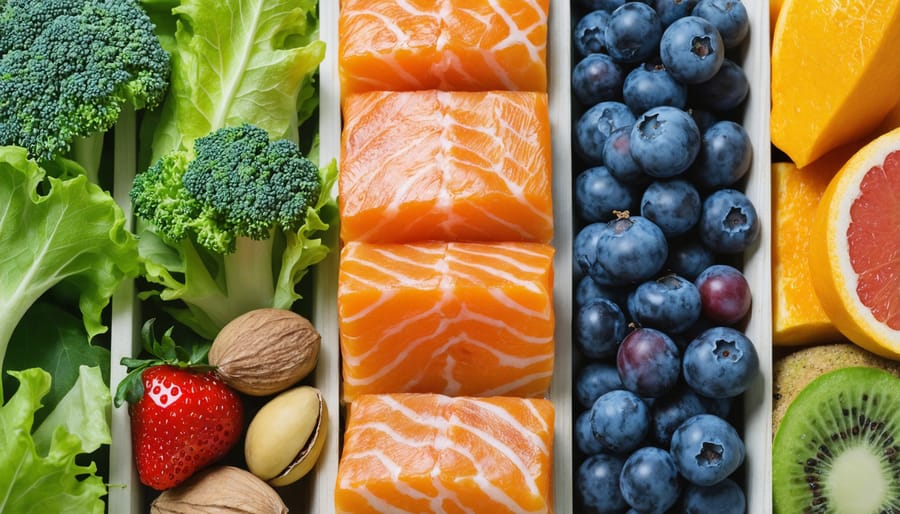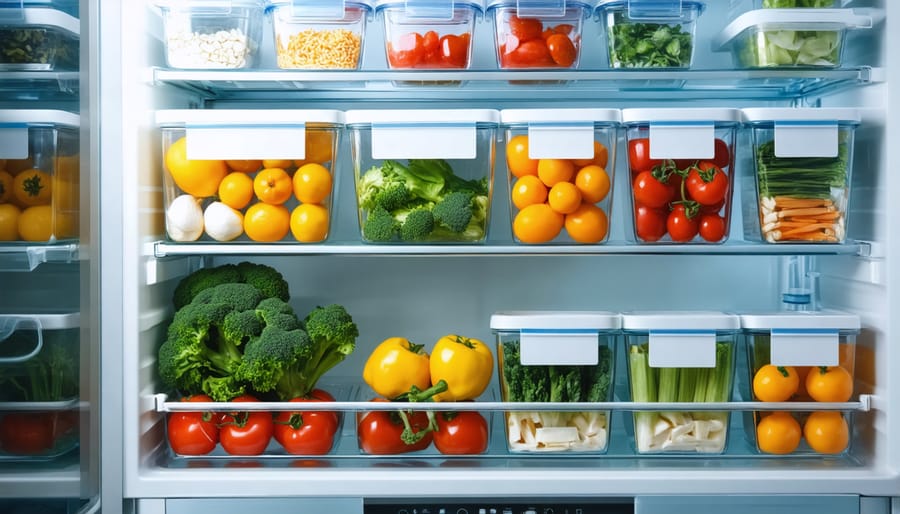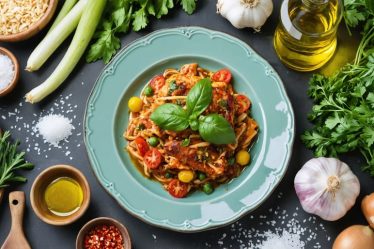
Creating a nourishing meal plan for our elderly loved ones transforms their daily nutrition from a challenge into an opportunity for better health and joy. This comprehensive 7-day meal plan combines age-appropriate portions, essential nutrients, and easy-to-prepare dishes that cater specifically to senior dietary needs. Whether you’re caring for an aging parent or planning your own golden-years nutrition, this week-long guide ensures every meal delivers the right balance of proteins, fiber, and vital nutrients while considering common concerns like dietary restrictions and reduced appetite.
Designed with both convenience and nutrition in mind, each day features simple, flavorful meals that can be prepared ahead of time, modified for different dietary needs, and enjoyed without complicated cooking techniques. From protein-rich breakfasts that maintain muscle mass to dinner options that promote better sleep, every meal has been carefully selected to support senior health while bringing the pleasure back to eating.
Let’s explore a week of delicious, nutritious meals that will help maintain independence, boost energy levels, and support overall wellbeing in the golden years. This meal plan isn’t just about feeding – it’s about nurturing health, independence, and quality of life for our seniors.
Understanding Senior Nutrition Needs
Key Nutrients for Aging Adults
As we age, our nutritional needs evolve, making it crucial to focus on specific nutrients that support healthy aging. Calcium and vitamin D are essential for maintaining strong bones, while protein helps preserve muscle mass and strength. I’ve learned from my own grandmother that incorporating nutritional powerhouses like leafy greens and fatty fish can make a significant difference in overall wellness.
Fiber becomes increasingly important for digestive health, while B12 supports cognitive function and helps prevent anemia. Potassium, magnesium, and omega-3 fatty acids play vital roles in heart health and inflammation reduction. Since appetite often decreases with age, it’s essential to make every bite count by choosing nutrient-dense foods.
Remember to discuss any dietary changes with a healthcare provider, especially if there are existing health conditions or medications that might affect nutrient absorption. Staying hydrated is also crucial, as the sense of thirst typically diminishes with age.

Special Dietary Considerations
When planning meals for elderly loved ones, it’s essential to consider common health conditions that may affect their dietary needs. Many seniors need to watch their sodium intake due to high blood pressure, while others may need to manage their sugar levels for diabetes. Heart-healthy options are crucial, focusing on lean proteins and foods low in saturated fats.
Texture modifications might be necessary for those with dental issues or difficulty swallowing. Consider soft foods that are easy to chew and digest. Some seniors may also need to avoid certain foods due to medication interactions, particularly with blood thinners.
For those with reduced appetite, which is common among elderly individuals, focus on nutrient-dense foods that pack more nutrition into smaller portions. It’s also important to account for any food allergies or intolerances that may have developed with age. When in doubt, always consult with their healthcare provider about specific dietary restrictions or requirements.
Remember to make gradual changes to their diet to ensure acceptance and enjoyment of new meal plans.

Complete 7-Day Meal Plan
Monday: Heart-Healthy Start
Start your week with meals designed to support heart health – something that’s especially important for our seniors. For breakfast, serve a warming bowl of old-fashioned oatmeal topped with fresh berries and a drizzle of honey. The soluble fiber in oats helps maintain healthy cholesterol levels, while berries pack a powerful antioxidant punch.
Lunchtime brings a Mediterranean-inspired tuna salad made with Greek yogurt instead of mayonnaise, served on whole-grain bread with crisp lettuce. Add cherry tomatoes and cucumber slices on the side for extra nutrients and hydration. This protein-rich meal is easy to prepare and gentle on dentures.
For dinner, enjoy baked salmon with a light lemon-herb seasoning, paired with steamed broccoli and quinoa. Salmon’s omega-3 fatty acids are excellent for heart and brain health, while the whole grains and vegetables provide essential fiber and nutrients. For those with smaller appetites, this meal can easily be portioned and saved for later.
Mid-morning and afternoon snacks can include a small handful of unsalted almonds or a piece of fresh fruit, keeping energy levels steady throughout the day.
Tuesday: Bone-Strengthening Day
Today’s menu focuses on building and maintaining strong bones, which is crucial for our elderly loved ones. Start the morning with a creamy bowl of Greek yogurt topped with sliced almonds and a drizzle of honey. Add some calcium-fortified orange juice on the side for an extra boost of vitamin D.
For lunch, prepare a delightful tuna melt on whole-grain bread, using calcium-rich cheese. Pair it with a cup of warming broccoli soup – both tasty and packed with bone-strengthening nutrients. Don’t forget to enjoy it near a sunny window or during a brief outdoor moment to help with natural vitamin D absorption.
The dinner star is a tender baked salmon fillet, naturally rich in both calcium and vitamin D. Serve it alongside steamed collard greens and quinoa pilaf. For a calcium-rich dessert, try a small bowl of rice pudding made with fortified milk and a sprinkle of cinnamon.
Between meals, offer calcium-rich snacks like cheese cubes with whole-grain crackers or a small glass of fortified milk with a few dried figs. Remember to keep portions manageable and textures appropriate for comfortable eating.
Wednesday: Digestive Wellness
Today’s menu focuses on promoting digestive health with fiber-rich foods that are gentle on the stomach. Start the morning with a warm bowl of steel-cut oatmeal topped with stewed prunes and a sprinkle of ground flaxseeds. The natural fiber content helps maintain regular digestion, which is especially important for our elderly loved ones.
For lunch, enjoy a light yet satisfying quinoa salad with steamed vegetables and lean chicken. We’ve found that practicing mindful eating habits during meals can significantly improve digestion and overall satisfaction.
Dinner features baked white fish with roasted sweet potato and steamed green beans. This combination provides essential nutrients while being easy to digest. Throughout the day, encourage sipping on caffeine-free herbal teas like chamomile or peppermint, which can aid digestion and provide comfort.
Don’t forget to include a mid-morning snack of yogurt with honey (rich in probiotics) and an afternoon serving of applesauce – both gentle on the stomach while supporting gut health. Remember to adjust portion sizes based on individual needs and preferences.
Thursday: Brain-Boosting Meals
Thursday’s menu features brain-boosting foods that help keep our loved ones sharp and energized. For breakfast, start with a wholesome bowl of steel-cut oatmeal topped with walnuts and blueberries – a delicious combination packed with omega-3s and antioxidants. Add a drizzle of honey for natural sweetness and a cup of green tea for an extra cognitive boost.
Lunchtime brings a Mediterranean-inspired tuna salad sandwich on whole-grain bread. The omega-3-rich tuna is mixed with Greek yogurt (instead of mayo), celery, and a sprinkle of herbs. Serve with cherry tomatoes and cucumber slices for added nutrients and hydration.
For dinner, enjoy baked salmon with roasted sweet potatoes and steamed broccoli. The salmon provides essential fatty acids for brain health, while the colorful vegetables deliver vital nutrients and fiber. Season everything with herbs like rosemary and thyme, which not only enhance flavor but also offer cognitive benefits.
For snacks, try a handful of mixed nuts or Greek yogurt with a spoonful of chia seeds. Remember to keep portions moderate and encourage plenty of water throughout the day to support proper hydration and digestion.
Friday: Energy-Sustaining Day
Friday’s menu focuses on sustained energy throughout the day, perfect for keeping our loved ones active and engaged. Start the morning with a warming bowl of steel-cut oatmeal topped with sliced almonds and fresh berries. The complex carbs from the oatmeal provide steady energy, while the nuts offer healthy fats and protein.
For lunch, serve a Mediterranean-inspired tuna salad sandwich on whole grain bread, paired with cucumber slices and cherry tomatoes. This combination delivers omega-3 fatty acids and protein, essential for maintaining muscle strength and brain health in seniors.
Dinner features lean baked chicken breast with roasted sweet potatoes and steamed green beans. The sweet potatoes are particularly beneficial, offering both fiber and vitamin A, while being easy to chew and digest. A small serving of sugar-free applesauce makes for a simple yet satisfying dessert.
Keep healthy snacks accessible throughout the day – think whole grain crackers with cheese in the morning and yogurt with a drizzle of honey in the afternoon. Remember to encourage regular water intake between meals to maintain proper hydration.
Saturday: Immune-Supporting Menu
Let’s boost that immune system with some delicious and nutritious meals! Start your Saturday with a vibrant breakfast of Greek yogurt topped with honey, mixed berries, and a sprinkle of vitamin E-rich sunflower seeds. The probiotics in yogurt are fantastic for gut health, which plays a crucial role in immunity.
For lunch, try a colorful citrus chicken salad made with tender grilled chicken breast, mandarin orange segments, and mixed greens. Add some sliced almonds and a light vinaigrette dressing for extra flavor and nutrients. Don’t forget to include some bell peppers – they’re packed with more vitamin C than oranges!
Dinner features baked salmon with roasted sweet potatoes and steamed broccoli. The omega-3s in salmon work wonderfully with vitamin E to support immune function, while sweet potatoes provide beta-carotene and vitamin C. A side of broccoli adds even more immune-boosting power to your plate.
For snacks, keep it simple with easy-to-eat options like orange segments, a small handful of walnuts, or whole-grain crackers with hummus. Remember to stay hydrated throughout the day with water, herbal tea, or homemade vitamin C-rich infused water with citrus slices.
Sunday: Family Dinner Special
Sunday is all about bringing the family together, and what better way than with a comforting dinner that everyone can enjoy? When it comes to family-friendly meal planning, this hearty yet easy-to-prepare menu hits all the right notes.
Start with a tender, slow-cooked pot roast that practically falls apart with a fork – perfect for seniors who might have difficulty chewing. Accompany it with soft-roasted root vegetables like carrots, potatoes, and parsnips, which are not only nutritious but also cook right alongside the meat. A side of green beans, lightly steamed until tender-crisp, adds color and essential nutrients.
For a sweet finish that won’t spike blood sugar levels, try a warm apple crisp made with rolled oats and a touch of cinnamon. The beauty of this meal is that it can be prepared earlier in the day, allowing more time for meaningful conversation around the dinner table. Plus, leftovers can be easily repurposed into nutritious meals for the coming days.
Remember to cut portions into manageable sizes and ensure everything is cooked to a safe temperature. Consider inviting family members to help with preparation – it’s a wonderful way to create memories while ensuring our seniors enjoy a wholesome, satisfying meal.
Meal Prep Tips for Success
Smart Shopping Strategies
Smart shopping for an elderly meal plan doesn’t have to be overwhelming! I’ve found that combining thoughtful planning with efficient meal prep strategies makes the process much more manageable. Start by creating a detailed shopping list organized by store sections to minimize back-and-forth walking. Consider shopping during off-peak hours when stores are less crowded and quieter.
Look for pre-cut vegetables and fruits if handling kitchen tools is challenging for your loved one. Many stores offer these convenient options without sacrificing nutritional value. When selecting ingredients, opt for foods with clear, easy-to-read expiration dates and manageable portion sizes to reduce waste.
Don’t forget to check for senior discounts and weekly specials! Many grocery stores offer special shopping hours and discounts for elderly customers. Consider buying non-perishable items in bulk when they’re on sale, but be mindful of storage space and expiration dates. For fresh produce, choose items at different ripeness levels to ensure they’ll be ready throughout the week.
Remember to keep emergency shelf-stable items on hand for days when shopping isn’t possible. These backup options should still meet nutritional needs while being easy to prepare.
Storage and Reheating Guidelines
Proper food storage and reheating are crucial for our elderly loved ones’ safety and meal enjoyment. Store all prepared meals in airtight containers and label them with the date of preparation – a simple sticky note works wonderfully! As a general rule, most cooked meals stay fresh in the refrigerator for 3-4 days.
For longer storage, portion meals into individual servings before freezing. This makes it easier for seniors to reheat just what they need. Most frozen meals remain good for up to three months when stored properly at 0°F (-18°C) or below.
When it comes to reheating, ensure food reaches 165°F (74°C) throughout to kill any harmful bacteria. A microwave-safe thermometer can be helpful here. For even heating, stir food halfway through and let it stand for a minute after heating. If using an oven, cover dishes with foil to prevent drying out.
Remember, if food looks or smells different than expected, it’s better to be safe than sorry – when in doubt, throw it out! This small precaution can prevent foodborne illness, which can be especially dangerous for seniors.

Taking care of our elderly loved ones through nutritious meals is a beautiful way to show our love and support. Remember, implementing this meal plan doesn’t have to feel overwhelming – take it one day at a time and adjust portions and ingredients based on individual preferences and dietary needs.
Start by introducing new recipes gradually, perhaps beginning with familiar favorites and slowly incorporating more variety. I’ve seen countless families successfully adapt similar meal plans by staying flexible and maintaining open communication about what works and what doesn’t.
Keep a printed copy of the meal plan on the refrigerator and involve your loved one in the meal planning process when possible. This not only helps with memory but also gives them a sense of control and involvement in their daily routine. Consider batch cooking and freezing portions for busy days, and don’t forget to check in regularly about portion sizes and food preferences.
Remember that staying hydrated is just as important as eating well. Keep water easily accessible throughout the day and encourage regular sipping between meals. If you’re caring for someone with specific dietary restrictions, don’t hesitate to consult with their healthcare provider about personalizing this plan.
Most importantly, celebrate the small victories and enjoy the precious moments shared over meals. Creating healthy eating habits for our elderly loved ones is a journey, not a race, and every step toward better nutrition is a step worth taking.



